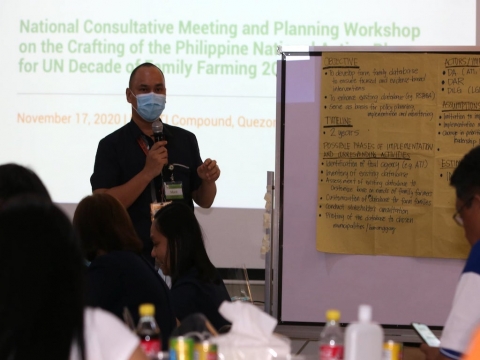Presentation of Workshop Outputs (Photo by Clemente Gabion)
QUEZON CITY --- The Department of Agriculture - Agricultural Training Institute (DA-ATI) convened some officials of DA bureaus and agencies for its first of the series of consultative meetings to develop the Philippines’ National Action Plan on Family Farming (NAPFF). This is in support to the United Nations’ Decade of Family Farming 2019-2020 (UNDFF) in addressing the challenges experienced by farm families. The next series of consultative meetings would be for the national government agencies, state universities and colleges, civil society organizations, farmers’ organizations and other institutions involved or with programs related to family farming.
ATI Director Alfredo S. Aton welcomed the participants and expressed his gratitude for their participation in the consultative meeting for the crafting of the Philippine National Action Plan for family farming.
In behalf of Agriculture Secretary William D. Dar, Undersecretary for Policy and Planning Rodolfo V. Vicerra delivered the keynote speech underscoring the importance of the UNDFF as an opportunity to holistically address farming family’s woes and substantially transform food systems toward the achievement of the 2030 Agenda for Sustainable Development.
“Family farms occupy around 70 to 80 percent of farmland and produce more than 80 percent of the world’s food in value terms. But despite this, family farmers are often poor and food-insecure themselves due to factors hindering family farmers to reach their full potential. We see the proclamation of the UNDFF 2019-2020 as timely and relevant to propel this advocacy,” Vicerra explained.
For her part, ATI Assistant Director Rosana P. Mula, presented the overview of the activity. She emphasized the importance of family farming, quoting Agriculture Secretary Dar:
“Smallholders and family farmers deserve the focus in [Food and Agriculture Organization] discussions and programs, as they produce over 80 percent of the world’s food in value terms, and play a vital role in achieving food security and improving nutrition,” she said.
Meanwhile, Agricultural Officer Pierre Ferrand of FAO Regional Office for Asia and the Pacific, through a virtual presentation, expounded on the three main challenges of family farmers, such as ageing family members, lack of legal recognition of their customary tenure rights, and limited access to productive resources.
“The contribution of family farming approach on the achievement of the Sustainable Development Goals is enormous. I wish this initiative will yield successful results as we hope to continue working with the DA family in the future,” Ferrand said.
The consultation meeting centered on leveling of understanding on family farming and addressing the issues and gaps toward adopting the farm family approach. It was attended by representatives from various DA bureaus, attached agencies, corporations, and national programs.
“As we aim for a harmonized blueprint toward a successful implementation, we are adopting a whole-of-DA approach and partnering with other relevant stakeholders in the agri-fishery sector to realize the fruition of this plan in farm family communities,” Mula added.
Held last November 17, 2020, the consultative meeting and workshop was the first of the series of consultation initiated by the DA-ATI. To craft a responsive and inclusive action plan, the succeeding batches will be composed of representatives from civil society organizations, local government units, and farmer groups. Legislators from the Congress and local councils will also be invited to advocate for policy support at national and local levels.###

